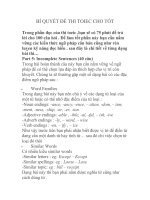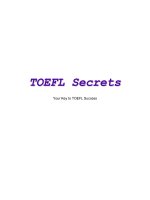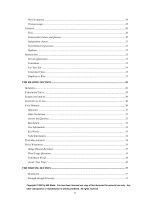Bí quyết trong các kì thi toeic 7 pdf
Bạn đang xem bản rút gọn của tài liệu. Xem và tải ngay bản đầy đủ của tài liệu tại đây (98.59 KB, 6 trang )
If these two clauses were separated with a period, the period would go before the
word “however” creating the following two sentences: The man in the red shirt
stood next to her. However, he did not know her name. The semicolon can
function as a weak period and join the two clauses by replacing the period.
Use Your Ear
Read each sentence carefully, inserting the answer choices in the blanks. Don’t
stop at the first answer choice if you think it is right, but read them all. What may
seem like the best choice, at first, may not be after you have had time to read all
of the choices. Allow your ear to determine what sounds right. Often one or two
answer choices can be immediately ruled out because it doesn’t make sound
logical or make sense.
Contextual Clues
It bears repeating that contextual clues offer a lot of help in determining the best
answer. Key words in the sentence will allow you to determine exactly which
answer choice is the best replacement text.
Example:
Archeology has shown that some of the ruins of the ancient city of Babylon are
approximately 500 years ____________ Mesopotamian predecessors.
A) as old as any supposed
B) as old as their supposed
C) older than their supposed
D) older than a supposed
In this example, the key word “supposed” is used. Archaeology would either
confirm that the predecessors to Babylon were more ancient or disprove that
supposition. Since supposed was used, it would imply that archaeology had
disproved the accepted belief, making Babylon actually older, not as old as, and
either answer choice C or D correct.
24
Copyright © 2002 by MO Media. You have been licensed one copy of this document for personal use only. Any
other reproduction or redistribution is strictly prohibited. All rights reserved.
Since choice D contains the word “a”. This would be correct if “predecessors”
was singular. Since “predecessors” is plural, with a “s” on the end of it, then
choice C must be correct.
Furthermore, because “500 years” is used, answer choice A and B can be ruled
out. Years are used to show either absolute or relative age. If two objects are as
old as each other, no years are necessary to describe that relationship, and it
would be sufficient to say, “The ancient city of Babylon is approximately as old as
their supposed Mesopotamian predecessors,” without using the term “500 years”.
Simplicity is Bliss
Simplicity cannot be overstated. You should never choose a longer, more
complicated, or wordier replacement if a simple one will do. When a point can be
made with fewer words, choose that answer. However, never sacrifice the flow of
text for simplicity. If an answer is simple, but does not make sense, then it is not
correct.
Beware of added phrases that don't add anything of meaning, such as “to be” or
“as to them”. Often these added phrases will occur just before a colon, which
may come before a list of items. However, the colon does not need a lengthy
introduction.
25
Copyright © 2002 by MO Media. You have been licensed one copy of this document for personal use only. Any
other reproduction or redistribution is strictly prohibited. All rights reserved.
The Reading Section
The Reading section of the TOEFL consists of a total of 44-60 questions.
There are three to six passages, which will each be followed by an average of six
to ten questions.
Skimming
Your first task when you begin reading is to answer the question “What is the
topic of the selection?” This can best be answered by quickly skimming the
passage for the general idea, stopping to read only the first sentence of each
paragraph. A paragraph’s first sentence is usually the main topic sentence, and it
gives you a summary of the content of the paragraph.
Once you’ve skimmed the passage, stopping to read only the first sentences, you
will have a general idea about what it is about, as well as what is the expected
topic in each paragraph.
Each question will contain clues as to where to find the answer in the passage.
Do not just randomly search through the passage for the correct answer to each
question. Search scientifically. Find key word(s) or ideas in the question that are
going to either contain or be near the correct answer. These are typically nouns,
verbs, numbers, or phrases in the question that will probably be duplicated in the
passage. Once you have identified those key word(s) or idea, skim the passage
quickly to find where those key word(s) or idea appears. The correct answer
choice will be nearby.
Example: What caused Martin to suddenly return to Paris?
The key word is Paris. Skim the passage quickly to find where this word
appears. The answer will be close by that word.
26
Copyright © 2002 by MO Media. You have been licensed one copy of this document for personal use only. Any
other reproduction or redistribution is strictly prohibited. All rights reserved.
However, sometimes key words in the question are not repeated in the passage.
In those cases, search for the general idea of the question.
Example: Which of the following was the psychological impact of the author’s
childhood upon the remainder of his life?
Key words are “childhood” or “psychology”. While searching for those words, be
alert for other words or phrases that have similar meaning, such as “emotional
effect” or “mentally” which could be used in the passage, rather than the exact
word “psychology”.
Numbers or years can be particularly good key words to skim for, as they stand
out from the rest of the text.
Example: Which of the following best describes the influence of Monet’s work in
the 20th century?
20th contains numbers and will easily stand out from the rest of the text. Use
20th as the key word to skim for in the passage.
Once you’ve quickly found the correct section of the passage to find the answer,
focus upon the answer choices. Sometimes a choice will repeat word for word a
portion of the passage near the answer. However, beware of such duplication –
it may be a trap! More than likely, the correct choice will paraphrase or
summarize the related portion of the passage, rather than being exactly the same
wording.
For the answers that you think are correct, read them carefully and make sure
that they answer the question. An answer can be factually correct, but it MUST
answer the question asked. Additionally, two answers can both be seemingly
27
Copyright © 2002 by MO Media. You have been licensed one copy of this document for personal use only. Any
other reproduction or redistribution is strictly prohibited. All rights reserved.
correct, so be sure to read all of the answer choices, and make sure that you get
the one that BEST answers the question.
Some questions will not have a key word.
Example: Which of the following would the author of this passage likely agree
with?
In these cases, look for key words in the answer choices. Then skim the
passage to find where the answer choice occurs. By skimming to find where to
look, you can minimize the time required.
Sometimes it may be difficult to identify a good key word in the question to skim
for in the passage. In those cases, look for a key word in one of the answer
choices to skim for. Often the answer choices can all be found in the same
paragraph, which can quickly narrow your search.
Paragraph Focus
Focus upon the first sentence of each paragraph, which is the most important.
The main topic of the paragraph is usually there.
Once you’ve read the first sentence in the paragraph, you have a general idea
about what each paragraph will be about. As you read the questions, try to
determine which paragraph will have the answer. Paragraphs have a concise
topic. The answer should either obviously be there or obviously not. It will save
time if you can jump straight to the paragraph, so try to remember what you
learned from the first sentences.
Example: The first paragraph is about poets; the second is about poetry. If a
question asks about poetry, where will the answer be? The second paragraph.
28
Copyright © 2002 by MO Media. You have been licensed one copy of this document for personal use only. Any
other reproduction or redistribution is strictly prohibited. All rights reserved.
The main idea of a passage is typically spread across all or most of its
paragraphs. Whereas the main idea of a paragraph may be completely different
than the main idea of the very next paragraph, a main idea for a passage affects
all of the paragraphs in one form or another.
Example: What is the main idea of the passage?
For each answer choice, try to see how many paragraphs are related. It can help
to count how many sentences are affected by each choice, but it is best to see
how many paragraphs are affected by the choice. Typically the answer choices
will include incorrect choices that are main ideas of individual paragraphs, but not
the entire passage. That is why it is crucial to choose ideas that are supported
by the most paragraphs possible.
Eliminate Choices
Some choices can quickly be eliminated. “Andy Warhol lived there.” Is Andy
Warhol even mentioned in the article? If not, quickly eliminate it.
When trying to answer a question such as “the passage indicates all of the
following EXCEPT” quickly skim the paragraph searching for references to each
choice. If the reference exists, scratch it off as a choice. Similar choices may be
crossed off simultaneously if they are close enough.
In choices that ask you to choose “which answer choice does NOT describe?” or
“all of the following answer choices are identifiable characteristics, EXCEPT
which?” look for answers that are similarly worded. Since only one answer can
be correct, if there are two answers that appear to mean the same thing, they
must BOTH be incorrect, and can be eliminated.
Example:
A.) changing values and attitudes
B.) a large population of mobile or uprooted people
29
Copyright © 2002 by MO Media. You have been licensed one copy of this document for personal use only. Any
other reproduction or redistribution is strictly prohibited. All rights reserved.









